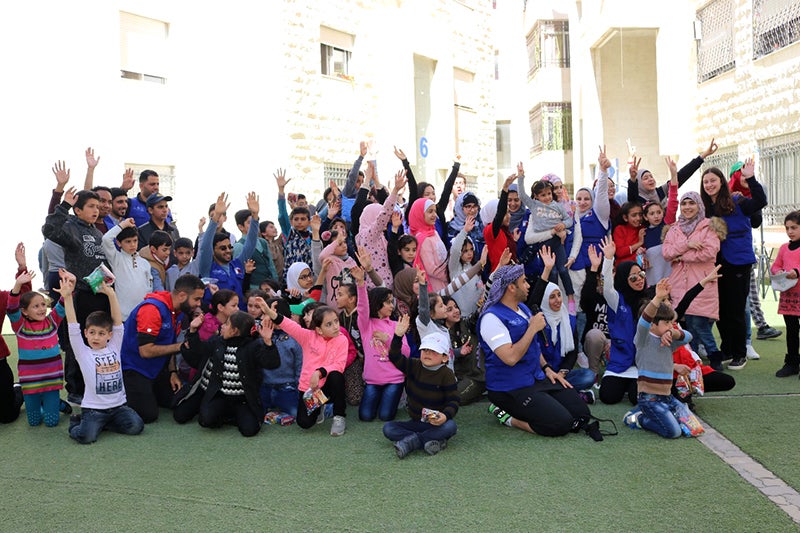
Hamad Bin Khalifa University (HBKU) students set on a learning educational service trip earlier this month to conduct research and gain a better understanding of the circumstances displaced refugees must endure in light of ongoing conflict. The trip involved 18 master’s, PhD, and undergraduate students who were accompanied by two HBKU representatives. Over the course of six days, the delegation visited numerous sites, interviewed refugees and orphans, and provided humanitarian relief to those in need. The trip was facilitated by the Education Above All foundation as well as Qatar Charity.
Students visited Nedaa Al Khair Society in Amman, Jordan. With direct engagement and exposure being an important element of their experience, the students learned about the hardships of poverty and the challenges faced by less fortunate children. Gifts and basic food items were provided to the children and their families.
Amongst other locations, the delegation visited the Jordan Hashemite Charity Organization, where they analyzed the institute’s ongoing developmental projects, partook in children activities and proactively contributed to the betterment of the lives of dozens of impacted individuals.
Faisal Al-Mohannadi, senior student engagement supervisor at HBKU who led the trip, said, “One of the primary goals we wanted to achieve by organizing this trip was to expose our students to global conflicts through personal and humanitarian lenses.”
“Our students have heard about these conflicts; they have read the news and watched expressive footage – however, we believe it is just as critical to their educational process to provide them with the opportunity to experience these situations first-hand. Much is to be learned in this process, and our students will use this learning experience to probe, analyze, and present recommendations through their theses and dissertations on ways to alleviate overall suffering.”
More than 1000 food baskets were provided to the needy throughout the trip. Additionally, the delegation worked with HBKU Press, the University’s publishing arm, to distribute children’s books with the aim of promoting literacy and a love for reading among the children.
The students and their supervisors also took part in site seeing and expeditions within the city of Jarash and the governorate of Al Batra. Other areas visited by the students included cancer-treatment centers and Madraset Insani for humanitarian relief. Clothing banks and school developmental projects were other integral aspects of the trip.
“The most rewarding aspect of this trip to Jordan was seeing the smiles on young faces. We witnessed first-hand how important it is to help fund these educational programs, which cater to the needs of displaced refugees. We left Jordan with unforgettable moments and life-long impressions, which we will continue to cherish as we return home,” said Saleh Al-Horr, a College of Science and Engineering student who went on the trip.
On the final day of the trip, the delegation was warmly hosted by the Qatar Embassy in Amman, as they described their experiences and offered tokens of appreciation to Eng. Abdulaziz Mohammed AlSadda, the embassy’s counselor in Jordan.
“We set on this trip with full knowledge that it will not be recreational. The trip was primarily humanitarian and providing relief was a key aspect in all of our endeavors. Much was learned by visiting local refugee camps and understanding the suffering of Palestinian children, as well as visiting learning and cultural centers that cater to Syrian refugees,” said Doaa Mohsen, a College of Humanities and Social Sciences student who was on the trip.
Every year, students from HBKU volunteer to assist underprivileged communities around the world. In January, the HBKU Student Affairs team and Qatar Charity organized a volunteer trip to Bangladesh to visit the Rohingya refugee camps in Cox’s Bazar, giving 16 students an on-ground perspective to the repercussions of the ongoing conflict. Through personal engagement, HBKU volunteers acquire a first-hand understanding of the multi-faceted challenges faced by people who are living in critical need of basic shelter, healthcare, nutrition, sanitation, education, and economic development.





